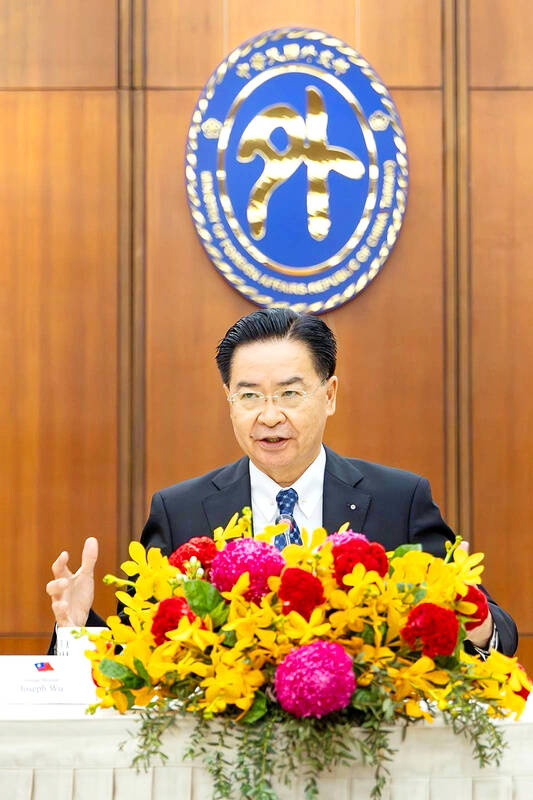Minister of Foreign Affairs Joseph Wu (吳釗燮) called on democracies around the world to defend Taiwan by defending Ukraine, which he said would help deter Beijing’s military adventurism.
“By helping Ukraine, democracies can increase their relative strength against the Chinese-Russian coalition,” Wu said in an article published in Foreign Affairs on Thursday.
Wu warned of the threat posed by China and Russia’s so-called “no-limits partnership,” adding that the two powers cannot be expected to take on the responsibility of maintaining a rules-based international order.

Photo courtesy of the Ministry of Foreign Affairs
China maintained a relatively neutral stance on Russia’s invasion of Ukraine at first, but began providing lethal weapons to Russia last year, demonstrating its “strong interest not just in propping up Russia but in reshaping the geopolitical landscape in Europe,” he said.
“With China and Russia in such close alignment, it is all the more imperative for democracies to act in coordination,” including continuing the assistance provided to Ukraine, Wu said.
The aid package to provide US$95 billion in funding for military assistance to Taiwan, Ukraine and Israel signed into law by US President Joe Biden last month is a welcome action in the effort and can serve as “a key deterrent against adventurism on Beijing’s part,” he said.
Taiwanese security is crucial to the global economy and regional stability, Wu said, adding that if China were to gain control of Taiwan, the world would face colossal economic losses and supply chain disruptions as well as the harms brought by China’s authoritarian expansionism.
“Preserving the status quo in the strait is vital to maintaining the US alliance system, the regional balance of power, and nuclear nonproliferation,” which have helped maintain a stable and prosperous Indo-Pacific region, Wu said.
Taiwan has made a whole-of-nation effort to strengthen its self-defense capabilities before soliciting support from the world, he said.
“[O]ur determination to defend ourselves will grow only stronger under our new president, William Lai (賴清德),” he added.
Wu is to lead the National Security Council in Lai’s incoming administration.
Wu called on democracies worldwide to “address more assertively” three areas with the global implications of the cross-strait situation in mind.
Like-minded countries should warn China of the consequences of its gray-zone coercion such as disinformation campaigns, election interferences and military provocations, he said.
Wu encouraged international friends to boost economic integration with Taiwan, adding that it would help them to strengthen their national supply chain resilience.
Wu also called on like-minded countries to reject China’s distortion of UN Resolution 2758 to lay claim to Taiwan.
The resolution was adopted in 1971 to solve the issue of China’s representation in the UN, and eventually led to China taking Taiwan’s place in the international organization.
The resolution recognized the People’s Republic of China (PRC) as the “only lawful representative of China.”
Taiwan and the US have repeatedly said that the resolution does not mention Taiwan, nor say that “Taiwan is part of the PRC=” and does not explicitly authorize Beijing to represent Taiwan at the UN.

The inspection equipment and data transmission system for new robotic dogs that Taipei is planning to use for sidewalk patrols were developed by a Taiwanese company, the city’s New Construction Office said today, dismissing concerns that the China-made robots could pose a security risk. The city is bringing in smart robotic dogs to help with sidewalk inspections, Taipei Deputy Mayor Lee Ssu-chuan (李四川) said on Facebook. Equipped with a panoramic surveillance system, the robots would be able to automatically flag problems and easily navigate narrow sidewalks, making inspections faster and more accurate, Lee said. By collecting more accurate data, they would help Taipei

STATS: Taiwan’s average life expectancy of 80.77 years was lower than that of Japan, Singapore and South Korea, but higher than in China, Malaysia and Indonesia Taiwan’s average life expectancy last year increased to 80.77 years, but was still not back to its pre-COVID-19 pandemic peak of 81.32 years in 2020, the Ministry of the Interior said yesterday. The average life expectancy last year increased the 0.54 years from 2023, the ministry said in a statement. For men and women, the average life expectancy last year was 77.42 years and 84.30 years respectively, up 0.48 years and 0.56 years from the previous year. Taiwan’s average life expectancy peaked at 81.32 years in 2020, as the nation was relatively unaffected by the pandemic that year. The metric

TAKING STOCK: The USMC is rebuilding a once-abandoned airfield in Palau to support large-scale ground operations as China’s missile range grows, Naval News reported The US Marine Corps (USMC) is considering new sites for stockpiling equipment in the West Pacific to harden military supply chains and enhance mobility across the Indo-Pacific region, US-based Naval News reported on Saturday. The proposed sites in Palau — one of Taiwan’s diplomatic allies — and Australia would enable a “rapid standup of stored equipment within a year” of the program’s approval, the report said, citing documents published by the USMC last month. In Palau, the service is rebuilding a formerly abandoned World War II-era airfield and establishing ancillary structures to support large-scale ground operations “as China’s missile range and magazine

A 72-year-old man in Kaohsiung was sentenced to 40 days in jail after he was found having sex with a 67-year-old woman under a slide in a public park on Sunday afternoon. At 3pm on Sunday, a mother surnamed Liang (梁) was with her child at a neighborhood park when they found the man, surnamed Tsai (蔡), and woman, surnamed Huang (黃), underneath the slide. Liang took her child away from the scene, took photographs of the two and called the police, who arrived and arrested the couple. During questioning, Tsai told police that he had met Huang that day and offered to